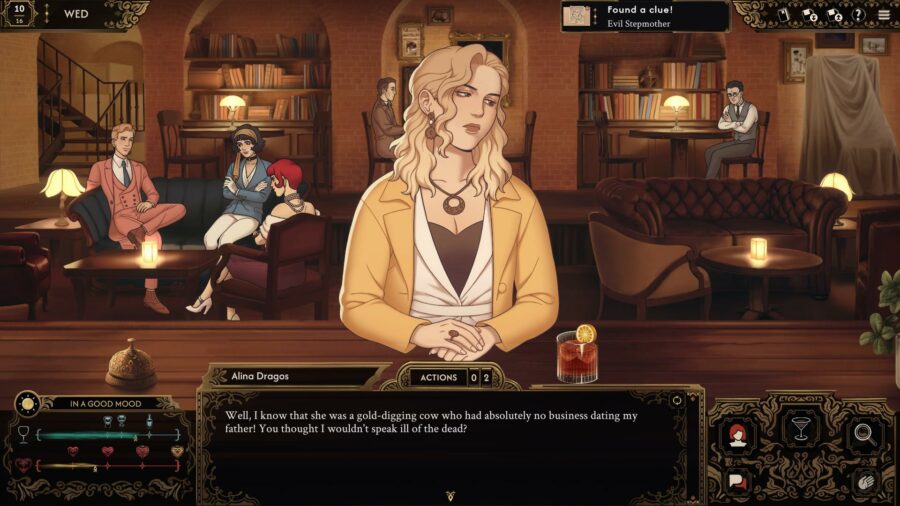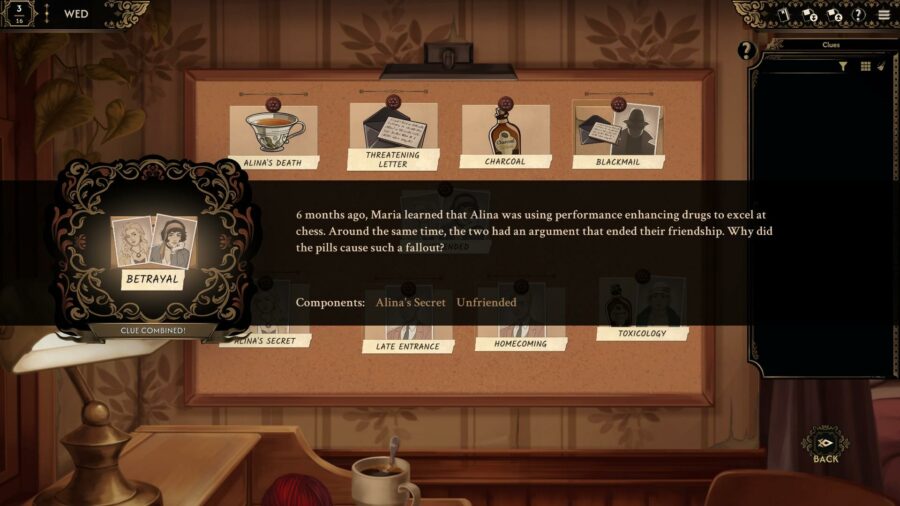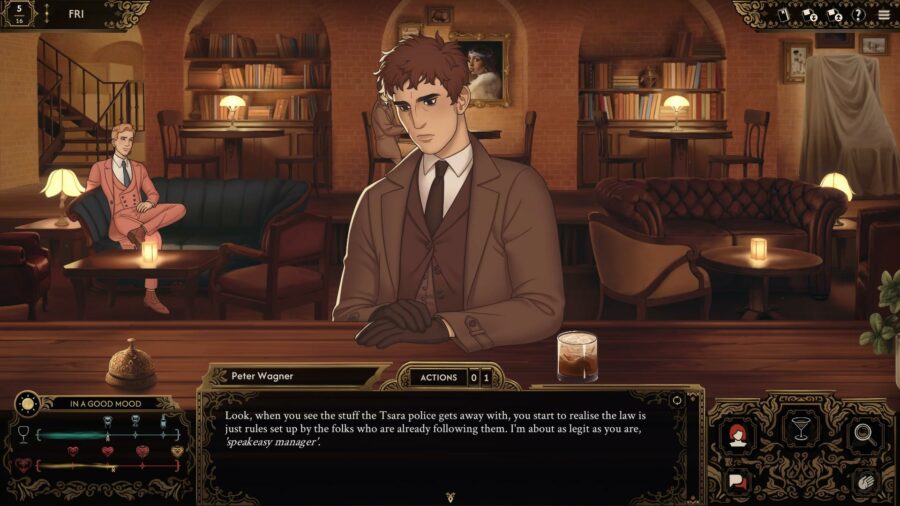I’ve grown to appreciate a visual novel that will let you screw up.
That was one of my primary issues with both Urban Myth Dissolution Center and Vampire Therapist. Both involve a series of puzzles that require some deduction skills, but neither have any kind of serious failure condition. If you’re wrong about something, both will simply let you keep guessing until you figure it out.
Best Served Cold, conversely, will happily let you become the world’s worst detective. It makes it very clear from the start that you’re being set up to fail, and proceeds to make it increasingly likely that you will.
BSC is set in an alternate 1920s, in a decaying central European city called Bukovie. Due to recent prohibition measures, it’s illegal to sell or consume alcohol within Bukovie, which has led to the opening of several underground speakeasies.
You play as an unnamed, unseen bartender who’s just picked up a bartending job at the Nightcap, a speakeasy beneath an old bookstore. You’ve barely gotten a chance to learn the ropes when a cop shows up to blackmail you. In exchange for not busting you, Detective Hugo Mertens forces you to gather information from the bar’s patrons so he can solve a recent murder.

That’s the first in a series of cases that put you in the role of an unwitting detective. You can choose your character’s general reaction to their situation, but it doesn’t actually change the situation. Hugo’s got all the power here, so you’re helping him either way.
Playing BSC is a balancing act between information gathering, befriending the Nightcap’s regulars, and plying them with alcohol. Everyone who stops by the bar knows something, and it’s a question of how to get it out of them. Once you figure out a given patron’s favorite drink, you can mix it up for them to gain affection points; alternatively, you might deliberately give them a stronger cocktail, in the hopes they’ll let some new information slip while they’re buzzed.

When you get certain crucial details about your current case, you can organize them on a pin board at the end of the night, then try to draw connections to generate more clues. If you can dig out the right pieces of information, including suspects’ potential motives, means, and alibis, you can eventually present your case to Hugo in hopes of keeping the bar open.
It’s a little harder than it sounds. The first case in BSC is a lay-up, with a suspect so obvious that I figured it had to be a red herring. As it turned out, that was just the tutorial. Starting with your second case, the most crucial leads are locked behind the relationship and drunkenness systems. On my first run, I managed to let a murderer escape at one point because I’d never managed to befriend them to the point where they revealed some crucial information.
I still wouldn’t call BSC particularly difficult, as it’s generous with its save slots and gives you a lot of room in which to experiment. It’d be harder if it was possible to antagonize a character to the point where they stopped going to the Nightcap, thus locking you out of whatever information they had, or if you couldn’t double back through conservation options you’ve already seen to look for easy relationship points. It’s more like a jigsaw puzzle with interactive pieces than a real mystery, although there’s some real potential in these systems.
By the time I’d reached BSC’s halfway point, however, I’d ended up more interested in its story and setting than its mechanics. Hugo is never depicted entirely without sympathy, and it’s clear from the start that his blackmail against you is a desperation move for a guy who’s ended up stuck in a corrupt system. By the same token, however, he’s too stubborn to simply quit, even after multiple incidents that make it clear he’s never been on the right side. Hugo is never a full ally, and is always a threat.
At a point in time where many mysteries end up feeling like “copaganda,” BSC has made several distinct choices to break away from that. It’s not a story about heroic cops fighting back the darkness, but instead puts its focus on everyday people who’re just trying to get by. There’s a glimpse of a potential future for crime fiction as a genre in here somewhere.

On the other hand, that’s one of several ways in which BSC ends up feeling like it’s set in a themed modern nightclub rather than an actual bygone era. The costume design is excellent, and each character has been carefully given their own unique voice, but it’s also brought in a number of modern sensibilities that are out of step with the depicted period. For example, a character in the introductory case is a manosphere gasbag (ah, what cruel fate, to be a Twitter troll a full 80 years before Twitter) and there’s a subplot about a slow-boil gay romance between two bar regulars that everyone else treats as an everyday event rather than a scandal.
I’ll grant that BSC is careful to establish that this isn’t exactly our Earth – England is “Albion,” China is “Huaxia,” the central religion is vaguely Catholic but involves a Goddess, etc. – but it’s still more period cosplay than historical fiction. BSC has multiple endings, and it wouldn’t shock me to learn that one of them involves the discovery that your hapless bartender has been Truman Show’d.
Also, your main character insists on making a Cuba libre with a martini shaker. It shouldn’t bother me. It consistently bothers me.
Despite those central dissonances, Best Served Cold is still a well-imagined, well-written piece of detective fiction, with enough mechanical tension to keep my interest throughout its 10 to 20 hours. There’s a lot of potential in both this setting and the game’s systems, and while it could use a little mechanical refinement, it’s worth a read for anyone who’s into old-school mysteries.
[Best Served Cold, developed and published by Rogueside, is now available for PC via Steam for $17.99; ports to Xbox, PlayStation, and Switch are forthcoming. This column was written using a Steam code sent to Hard Drive by a Rogueside PR representative.]




